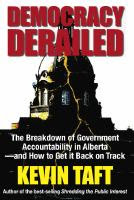“With political change so rare, one-party politics has become entrenched in Alberta. The forces that drive political change in other jurisdictions – the legislature, public inquiries, interest groups, opposition parties, the media, and so on – have adapted to this reality in order to cope, or have been deliberately gutted, or have simply deteriorated to the status of a sideshow. As a result of this one-party dominance, democracy in Alberta has been pushed off the rails. It’s time to get it back on track.”
This is how Alberta Liberal Leader Kevin Taft finishes the introduction of his new book “Democracy Derailed: The Breakdown of Government Accountability in Alberta – and How to Get it Back on Track.” I’ve had the chance to read through an advanced copy of the book and I have some thoughts as it is released today.
Democracy Derailed covers a wide range of political and ethical transparency and accountability issues in Alberta’s long-time Tory-dominated political scene. Throughout the 110-page book, Kevin Taft recounts his experiences as an MLA and leader of the Official Opposition in dealing with Alberta’s democratic deficit as well as presenting positive solutions on how to make democracy better in Alberta.
The issues addressed in the book range from Alberta’s lack of whistle-blower protection for public servants and the devolution of power from the elected Legislative Assembly to the lack of power held by Alberta’s Auditor General and the irresponsible use of FOIPP legislation to block opposition research and the lack of resources allotted to Opposition Caucus Offices in Alberta compared to those allotted to the PC Members Caucus and opposition caucuses in other provinces.
One of the interesting facts that Taft highlights is the lack of power held by Alberta’s Public Accounts Committee:
“Alberta’s Public Accounts Committee can meet once a week only when the legislature is sitting, which is all of three months per year. During approximately a dozen 90-minute meetings, the committee must review the spending of 24 provincial government departments with a combined budget of $24 billion.
That’s not all. Unlike the federal Public Accounts Committee, Alberta’s Public Accounts Committee cannot submit a report to the legislature. Legislators outside of Alberta find this restriction hard to fathom. Conservative Member of Parliament John Williams said “It’s shocking. I cannot believe a government majority would use their capacity to set the rules like that.””
According to Taft, underlying many of these problems is the near merger between the Government of Alberta and the Progressive Conservative Association of Alberta (which formed government in 1971). This is problem which would occur after any political party has governed for over 30 straight years. Examples Taft uses include the appointments of partisan Tories as elections officials, the Calgary Ward 10, Kelley Charlebois, and Alberta Securities Commission scandals, the partisan nature of the Public Affairs Bureau, and the fluid movements of Rod Love and Peter Elzinga through Government, business, and the PC Party.
The book is also complemented by a website (www.democracyderailed.ca) which includes links and pdf documents sited in the book (such as Ralph Klein’s infamous plagiarized Chile paper), along with an online interactive message board and an online quiz.
The timing of the book is probably better than Taft and the Alberta Liberals had originally planned. With new and untested Tory Premier Ed Stelmach still learning the ropes, a March/April 2007 sitting of the Legislature, and a potential Fall 2007/Spring 2008 provincial election, Democracy Derailed will hopefully raise some much needed attention and debate on some serious problems facing democracy in Alberta.

